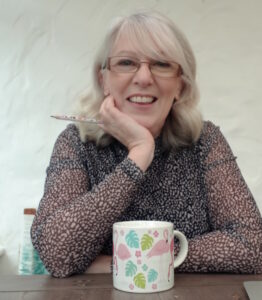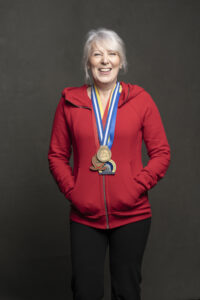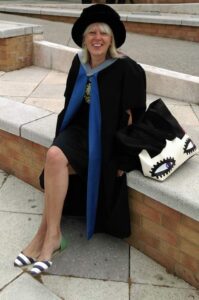 I spent the first 50 years of my life waiting to be found out. It was as if I was constantly trying to ‘catch up’ but was never quite sure what exactly I was trying to catch up with! I’ve always done things at least a decade later than most of my peers, whether that was going to parties or learning to drive. I didn’t go to University until I was 30 – and even then it was on day release, whilst working full time as a mental health nurse. It’s not that I didn’t want to do those things, but more I didn’t think they were for ‘people like me’.
I spent the first 50 years of my life waiting to be found out. It was as if I was constantly trying to ‘catch up’ but was never quite sure what exactly I was trying to catch up with! I’ve always done things at least a decade later than most of my peers, whether that was going to parties or learning to drive. I didn’t go to University until I was 30 – and even then it was on day release, whilst working full time as a mental health nurse. It’s not that I didn’t want to do those things, but more I didn’t think they were for ‘people like me’.
As children, ‘people like me’ lived on the ‘poor estate’. ‘People like me’ were looked down upon and not expected to achieve anything. We were never included in playdates and never wanted to invite anyone home out of embarrassment, because of where we lived. We never had the right clothes; everything was either too big or too small, whatever had been left over, handed down or picked up at a jumble sale. I’m still never sure if I’ve got things right socially, always worrying if I’m betraying myself with some unconscious crassness.
I could tell you that this story starts with my first memories of my loving but chaotic family or the estate where I lived; memories that include being sneered at: ‘if you live there, you must be really poor’. Memories of not being allowed to swim in our primary school pool because we couldn’t afford a bathing cap, or of living on sugar pancakes and scrambled eggs for weeks because dad had gambled away the weekly wages again. Or perhaps I could start with the day we got evicted by the bailiffs because of unpaid debts and they took my soft toys away along with the furniture? To this day, I cannot face pancakes.
Living in a constant state of anxiety about food and a roof over our heads, with parents who were sure ‘the universe would provide’ or ‘something would turn up’ created a strong pattern of responsibility in me towards my younger brother and sister and a yearning for financial security.
 These memories were packed away for a long time. I left home, moved to the UK and trained as a mental health nurse. This was arguably an extension of my pattern of ‘caretaking’, but I’d found a career that enthralled me. Whilst not exactly lying about my background, I spent these years not being entirely honest either. You see, I grew up in Jersey in the Channel Islands which is seen as a tax haven. When people hear that, they often assume that I grew up if not in a wealthy home, then at least a comfortable one. They didn’t really use places like my estate for backdrops on the Jersey-based TV series Bergerac! I rarely corrected people, feeling a sense of shame and an anxiety about what they might think of me if they knew. I chose not to dwell on my memories. I’d crossed the English Channel to escape and although I’m back on the island now, for years I’d chosen not to revisit the memories it held.
These memories were packed away for a long time. I left home, moved to the UK and trained as a mental health nurse. This was arguably an extension of my pattern of ‘caretaking’, but I’d found a career that enthralled me. Whilst not exactly lying about my background, I spent these years not being entirely honest either. You see, I grew up in Jersey in the Channel Islands which is seen as a tax haven. When people hear that, they often assume that I grew up if not in a wealthy home, then at least a comfortable one. They didn’t really use places like my estate for backdrops on the Jersey-based TV series Bergerac! I rarely corrected people, feeling a sense of shame and an anxiety about what they might think of me if they knew. I chose not to dwell on my memories. I’d crossed the English Channel to escape and although I’m back on the island now, for years I’d chosen not to revisit the memories it held.
When I did return to Jersey, it looked like I was doing really well. I was accomplished, bristling with academic qualifications and had a career that meant I was now working for a University. I was a member of that annoying acronym DINKY (Dual Income No Kids Yet) – but with a dog – meaning I could travel and follow my interests as they evolved. Although I was 35, I even started running marathons. And in those terms, I was…doing well. I had a secret though. I didn’t think I belonged. I was just waiting for people to notice, pull the rug out from under me and ask what I was asking myself; ‘How has someone like her ended up here?’
The technical term for how I felt is ‘imposter syndrome’. It’s used to describe accomplished people who believe they don’t deserve recognition and they’re less competent and intelligent than they appear to be. When you read about the contributing factors, I’m arguably a textbook case: working class background, first born, first in the family to achieve academic or professional success, no expectations or encouragement from school or family regarding achievement. I could tick all of those boxes. People who fit that profile are more likely to say they’ve been lucky to get where they are and underplay their talent. That’s what I know now and if I’d understood that earlier, things might have been different. But for most of my life, I just hid. Hid my voice, hid who I was and where I was from, scared that if people knew the real me, they would walk away.
 So this story starts much later than it should; somewhere past the middle of my life when aged 47, against all the odds and whilst working as a Senior Lecturer in Higher Education, I found myself in the middle of a doctoral research programme. Before starting our investigations as new researchers we were encouraged to think about what influenced us, so that we’d be aware of our own potential biases. This involved creating a mind map of my home/childhood/family/educational experiences, questioning how these had influenced my views, values and beliefs about the world and shaped the type of practitioner and researcher I was becoming. Sounds interesting, I thought. Right up my street. I enjoy journaling, I like to think I’m a reflective person – and who doesn’t love a good, colourful mind map? But I was avoiding it and I couldn’t work out why. I put it off for weeks until finally I sat down with coloured pens and a big sheet of paper to entice me (I like playing with colour!) Then as red, blue, yellow, green decorated the paper, I understood.
So this story starts much later than it should; somewhere past the middle of my life when aged 47, against all the odds and whilst working as a Senior Lecturer in Higher Education, I found myself in the middle of a doctoral research programme. Before starting our investigations as new researchers we were encouraged to think about what influenced us, so that we’d be aware of our own potential biases. This involved creating a mind map of my home/childhood/family/educational experiences, questioning how these had influenced my views, values and beliefs about the world and shaped the type of practitioner and researcher I was becoming. Sounds interesting, I thought. Right up my street. I enjoy journaling, I like to think I’m a reflective person – and who doesn’t love a good, colourful mind map? But I was avoiding it and I couldn’t work out why. I put it off for weeks until finally I sat down with coloured pens and a big sheet of paper to entice me (I like playing with colour!) Then as red, blue, yellow, green decorated the paper, I understood.
Wave after wave of unsettling memories washed over me. My husband was quietly reading on the sofa next to me and all he could hear were big sighs and exclamations of ‘Oh my God!’ and ‘You’ve got to be kidding!’ At one point I just started giggling uncontrollably at the sheer ridiculousness of the situation and had to ask the question I thought everyone else would ask… How the hell did someone like me get to the point of doing a doctorate? This was a lightbulb moment. As my memories revealed themselves in all their colourful glory, I could see the choices I’d made in life and career came from feeling very marginalised at home, school and work. I started to realise something I wish someone had told me when I was younger. ‘People like me’ can and should do these things in life, as we have a voice and a contribution to make.
Having opened that door in my mind, I was ready to hear that one of my friends had done the Hoffman Process and she talked me through how it had helped her. Soon after that, I read an intriguing article by Dylan Jones in GQ magazine about his Hoffman experience. At this point in my life I wasn’t unhappy, but I couldn’t shake off that ‘caretaker’ feeling. I didn’t have healthy boundaries with my family and had a nagging feeling that there was unfinished business in my head. If asked, I would have said I was living two thirds of a life. So I decided to invest in my own future and happiness and signed up for the course.
Doing the Process in 2017 with an inspirational group of fellow participants and well-trained, insightful facilitators took away my fears of being vulnerable. I spoke my truth and nobody ran in the opposite direction! Before I went, I knew intellectually that I wasn’t responsible for other people’s emotions, actions or reactions, but after the Process I was able to embody that understanding. I put down healthy boundaries around my family and my confidence soared. I no longer felt I was an imposter. I applied for my dream job which I’d never have felt able to do before – and I got it. I used the tools they teach you on the course very regularly for a long time and noticed myself making different choices in my interactions with friends and colleagues.
If I’ve made this sound an easy transition – it isn’t. It’s called a Process for a reason. The insights I gained during that week have helped me to continue to reclaim my past and explore how the expectations of others have constrained or lifted me at different stages in my life. However, I realised in the end that the person who put most limits on me was myself. Instead of shamefully hiding it, I am now open about my background and I’ve reclaimed the pride of the people and the places that have contributed to me becoming me. My background has not made me vulnerable – it has made me strong.
Having retrained as a professional coach, I now coach others who feel they haven’t found their place in the world, who feel like an imposter or who think that certain opportunities are not for them. I coach ‘people like me’.
Three things I now know:
- If I’m not honest about who I am and where I come from, I’m not living authentically
- My background has not made me vulnerable, it has made me empathetic and committed to supporting others from disadvantaged backgrounds
- When I’m feeling vulnerable, instead of withdrawing and hiding, I unpick the feeling and work out a way to use what I know
We’d like to thank Julie for sharing her Process story. If you’d like to find out more about her coaching and training consultancy, visit https://peoplelikemecoaching.com or connect via twitter @JulieLuscombe or Linked In https://www.linkedin.com/in/dr-julie-luscombe-901a45105/





 Sign up to receive monthly newsletters from Hoffman
Sign up to receive monthly newsletters from Hoffman